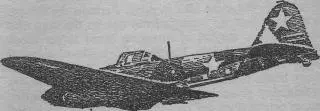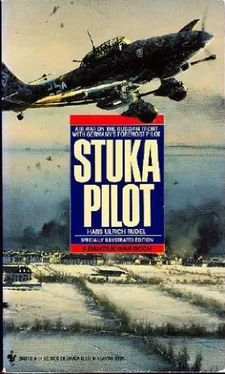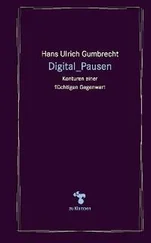“Your transfer was only half as bad as you thought, you see that now. Yes, it is a mistake to be too eager to play providence!” says Steen as he greets me. When he joins us in the squadron mess tent for the first time at Janowici there is the dickens of a racket going on. An ancient L.A.C. had been trying to fill his lighter from a large petrol tin. He does it by tilting the tin with the result that the petrol spills over the lighter whereupon he keeps flicking it to see if it is already working. There is a terrific bang; the tin explodes in his face and the L.A.C. pulls a face as if the explosion were a breach of military regulations. A sad waste of good petrol; for many old women are only too glad to swap eggs for a little petrol. This is of course forbidden because petrol is meant for other uses than the concoction of spirituous liquor by old women Even one drop of the stuff they manufacture bums our skin. Everything is a question of habit. The chancel of the village church has been converted into a cinema, the nave into a stables. “Different people, different customs,” says Flt./Lt. Steen with a chuckle.
“The great motor road from Smolensk to Moscow is the objective of many of our sorties; it is crowded with immense quantities of Russian material. Lorries and tanks are parked there beside one another at the closest intervals, often in three parallel columns. If this mass of material had poured over us…” I cannot help thinking as I attack this sitting target. Now in a few days’ tine it will all be a vast sea of wreckage. The advance of the army goes forward irresistibly. Soon we are taking off from Duchowtchma, not far from the railway station of Jarzewo the possession of which is later hotly contested.
On one of the following days a Rata dives from above into our formation and rams Bauer; the Rata crashes and Bauer flies home with a severely damaged aircraft. That evening the Moscow radio sings a hymn of praise for the Soviet pilot officer who “rammed and brought down a Stuka swine.” The radio must be right and we since childhood have always enjoyed listening to fairy stories.
About two miles away from us the army is preparing a new major operation. So quite unexpectedly we receive orders to move to another area. Our new station is called Rehilbitzy and lies some ninety miles west of Lake Ilmen. From dawn till dusk we support the army to the East and to the North.
At Rehilbitzy the summer months are very hot; the minute we come off duty we lie down on our camp beds in the coolness of our tents. Our skipper is living with us under canvas. We have not much to say to each other, but we have a feeling of mutual understanding. We must be essentially alike in character. In the evenings after ops, he strolls off into the forest or across the steppe, and if I do not accompany him I am pretty sure to be either putting the weight or throwing the discus or taking a long distance run round the airfield. These are the ways in which each of us finds recreation after a hard day’s flying and is fresh for the next day. Afterwards we sit about in our tent. He is not much of a drinker, and does not hold it against me that I do not drink at all. After reading a book for a while he will look up at someone in the circle and remark: “Well, Weinicke, you must be pretty well fagged out?” And before one can deny it: “All right, then, let’s turn in.”
So we always go to bed early, and that suits me. “Live and let live” is his motto. Steen’s previous experiences have been much the same as mine; he has profited by them and is determined to be a better C.O. than those he served under. On operations he exerts a peculiar influence over us. He dislikes heavy flak just as much as the rest of us, but no defense can be so strong as to make him drop his bombs from a greater altitude. He is a grand fellow, an exceptionally good officer and a first rate airman, a combination of virtues which makes him a very rare bird. Steen has the oldest rear-gunner in our formation, W. O. Lehmann. I have the youngest. Corporal Alfred Scharnovski. Alfred is the thirteenth child of a simple East Prussian family; he seldom speaks and perhaps for that reason nothing ruffles him. With him I never have to worry about enemy fighters, for not even Ivan can be as dour as Alfred.
Here at Rehilbitzy we sometimes get storms of terrific violence. Over vast areas Russia has a continental climate, and the blessing of cooler weather has to be paid for by thunderstorms that are thunderstorms. It suddenly gets pitch dark in the middle of the day and the clouds hang almost on the ground; the rain comes down in sheets. Even on the ground visibility is reduced to a few yards. As a rule when in the air we give the storm centers a wide berth. It seems, however, inevitable that one day or another I shall get a close view of all this.
We are giving offensive and defensive support to me army in the Luga sector of the front. Occasionally we are also sent out on operational missions far into the interior. The objective of one of these missions is the railway station at Tschudowo, a very important junction on the Leningrad—Moscow line. We know the enemy’s flak and fighter strength from earlier missions there. The A.A. defense is heavy, but unless fresh fighter formations have recently arrived in this area we do not anticipate any particular surprises. Just before we take off a formation of Russian battle aircraft which we call “Iron Gustavs” attacks our air field. We tumble into the split trenches behind our aircraft. Pit/Off. Stahl is the last to jump in, and lands right in the small of my back. That is more uncomfortable than the Iron Gustavs’ raid. Our flak opens up on them, Gustav jettisons his bombs and makes off at low level. Then we take off, setting a N.W. vector at an attitude of 9,000 feet. Not a cloud in the sky. I am flying as No. 2 behind the skipper. During flight I bring my wing plane level with his and look straight into his cockpit. His face is calm confidence personified.

IL 2 “Iron Gustav”
After a while the deep blue of Lake Ilmen sparkles ahead of us. How many times have we come this way, to Nowgorod at the northern end of the lake or near Starja Rusa to the South! Both are key points, and with a rush memories of the tight comers we have been in come to mind. As we approach our objective a sheer black wall of storm blots out the horizon. Is it just before or beyond our target? I see Flt./Lt. Steen studying his map and now we are flying through a development of dense cloud, the advance guard of the storm front. I cannot make out the target. It must therefore lie below the storm. We should now be very near it by the clock. In this monotonous landscape the tattered clouds increase the difficulty of finding one’s bearing by eye.
For seconds we are in darkness, then it is light again. I close up to an interval of perhaps 3 to 6 feet so as not to lose sight of the wing plane of my skipper’s aircraft in the clouds. If I do I run the risk of a collision. Why does not Steen turn back? Surely we shall not try to attack in this storm. It would not be possible. The flights behind us have already taken positions, evidently with the same idea in mind. Perhaps the skipper is trying to find the enemy’s front line on the map with the intention, maybe, of attacking some target there. He loses a little height, but there are banks of cloud at every level. Steen looks up from his map and suddenly banks round at an angle of 180 degrees. He has presumably given heed to the bad weather situation, but of course does not reckon with the nearness of my wing-plane. My reaction is instantaneous; I bank sharply, and still more sharply, and so avoid a collision. I have turned over so far that I am almost flying upside down. My aircraft is carrying 700 Kg. bombs and now this weight pulls my aircraft at a terrific speed onto her nose, and I disappear in the inky sea of clouds.
Читать дальше













